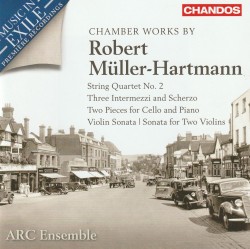 Chamber Works of Robert Muller-Hartmann
Chamber Works of Robert Muller-Hartmann
ARC Ensemble
Chandos CHAN 20294 (chandos.net/products/catalogue/CHAN%2020294)
Volume seven of the Music in Exile series spotlights German-Jewish composer Robert Müller-Hartmann (1884-1950), whose compositions, prior to being banned by the Nazis, had been conducted by Richard Strauss and Otto Klemperer. The works on this CD, all receiving their first recordings, were composed before 1937, when Müller-Hartmann left Germany and settled in Dorking, England, where his elder daughter had previously found employment. There, he became close friends with another Dorking resident, Ralph Vaughan Williams. Briefly interned as an “enemy alien” in 1940, he was released after Vaughan Williams interceded.
No avant-garde adventurer, Müller-Hartmann looked back to Viennese late-Romanticism for inspiration. Graceful, sentimental gemütlichkeit imbues the CD’s earliest work, the Violin Sonata, Op.5, which premiered in 1923. Similarly, the very Brahmsian Two Pieces for cello and piano – Meditation and Elegy – are warmly, earnestly expressive. Three Intermezzi and Scherzo, Op.22 for piano are affable and appealing, Brahms again invoked in Intermezzo I. Particularly charming is Müller-Hartmann’s Sonata, Op.32 for two violins, four genial, sprightly dance-like movements. While more “serious,” the String Quartet No.2, Op.38 is no less entertaining, a soulful Adagio surrounded by three movements enlivened by repeated tempo-changes and animated rhythms.
Toronto’s ARC Ensemble, under artistic director Simon Wynberg, continues to honour composers suppressed or exiled by dictatorships and war. Wynberg and the ensemble’s core musicians – violinists Erika Raum (in Op.5) and Marie Bérard, violist Steven Dann, cellist Thomas Wiebe and pianist Kevin Ahfat – surely deserved to be honoured as well.



